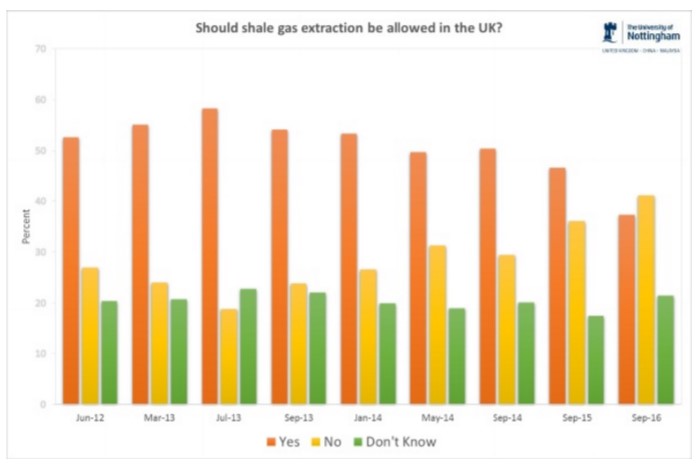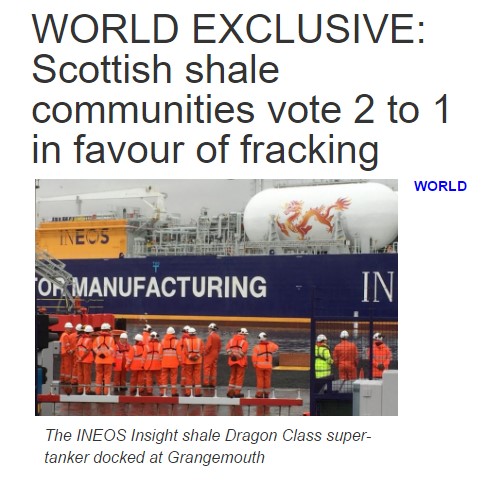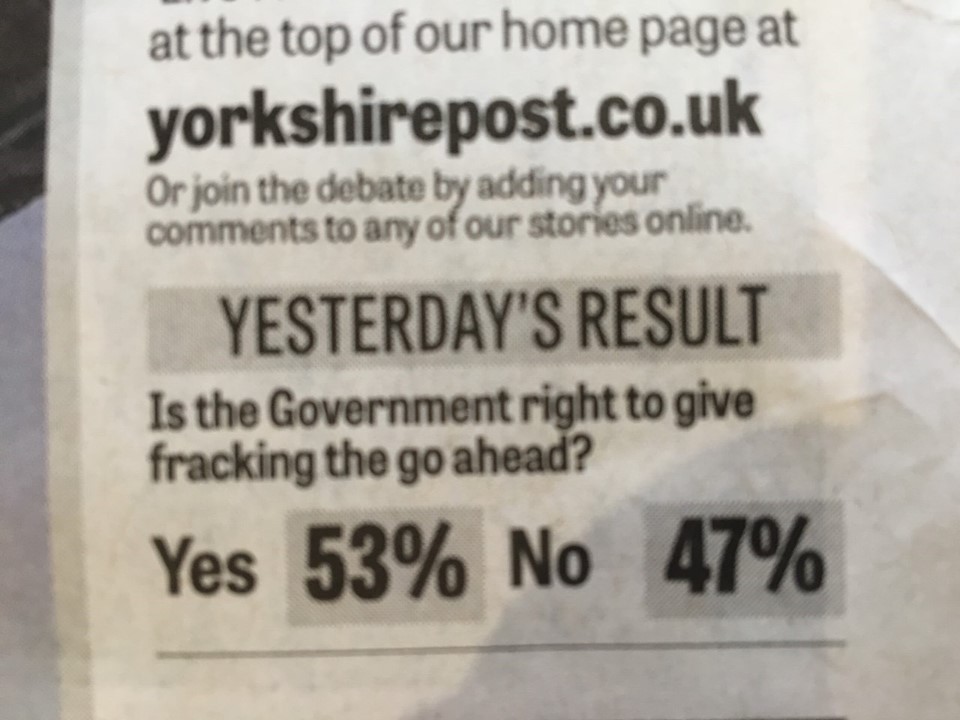DrillOrDrop reviews recent public opinion surveys on shale gas

Data from Nottingham University’s ongoing poll
The long-running Nottingham University survey of public attitudes to shale gas extraction has recorded its lowest level of support for fracking. And for the first time in this poll, more people oppose than support shale gas.
The poll, by YouGov, was carried out before the Local Government Secretary overruled Lancashire County Council’s refusal of planning permission for fracking by Cuadrilla at a site in Lancashire.
The results, published today, show that support for shale gas extraction has fallen from more than 58% in July 2013 to just over 37% in September 2016. Opposition has risen from a low of 19% in July 2013 to 41% in September 2016.
The percentage difference between support and opposition has changed from more than 39% in favour in July 2013 to nearly 4% against.

The latest results also found:
- Associations of shale gas with water contamination rose to more than 49%, the highest level recorded
- Falling levels of people associated shale gas with clean energy
- Falling numbers thought shale gas would bring economic benefits or energy security
- Shale gas was the least acceptable energy source in the UK’s 2025 energy mix
- Increasing numbers associated shale gas with higher greenhouse gas emissions
Click here for more information and survey charts
Professor Sarah O’Hara, of the School of Geography at Nottingham University and co-director of the Shale Gas Survey, said:
“The drop in support for shale gas over the last 12 months suggests that concerns about the perceived environmental impacts of shale gas are beginning to outweigh the possible economic benefits.
“This drop is driven largely by women firming up their view on this issue and becoming increasingly opposed to shale gas. If the government pushes forwarded with its plans to fast track shale gas developments, it must be prepared for significant levels of opposition from grass roots activists.”
Professor Mathew Humphrey, of the university’s School of Politics and International Relations and co-director of the survey, said:
“This survey continues the developments that we have seen since the protests at Balcombe in August 2013. At that point, trends in public opinion went into reverse, and the UK public appears to have become rather more sceptical about the potential costs and benefits of shale gas”.
Ken Cronin, Chief Executive of the industry organisation UK Onshore Oil and Gas told The Guardian:
“We have long believed that once people get to see how little impact shale gas exploration has on the environment and communities then attitudes will swing strongly in favour.”
The Nottingham survey has consistently recorded higher levels of support for shale gas than the quarterly Wave Tracker for the Department of Energy and Climate Change, now Business, Energy and Industrial Strategy. The latest figures (July 2016) from that poll are: Support 21%, opposition 31%, don’t know or neutral 48%.
Survey details
4,492 people took part in the latest Nottingham University poll by YouGov between 29 September and 3 October 2016. YouGov said participants were a nationally-representative selection of members of the YouGov panel. This is open to anyone to join and members who take part in surveys earn points which can be exchanged for cash.
INEOS surveys
Recent press coverage of the INEOS media tour of Pennsylvania referred to company surveys of attitudes to shale gas which found a majority of people in support.
The chemical industry website, ICIS.com, reported:
“At INEOS community events, 55% of people have been in favour of shale gas development with 15-20% neutral, according to company surveys.”
And Scottish Energy News reported, as an exclusive,
“A source close to senior INEOS management told Scottish Energy News: “In every opinion poll we run, it’s a two-thirds ‘yes’ to one-third against exploring for shale.”

INEOS told DrillOrDrop the surveys were “informal polling”. A spokesperson said the reports referred to two separate sources of information:
- Feedback forms filled in by 84 of the 136 people who attended four meetings for local councillors in Cheshire, Derbyshire and Yorkshire earlier this year
- Votes by 356 people in a voting box on the INEOS stand at the Royal Cheshire Show (two days) and the Malton Show (one day)
From the feedback forms, INEOS said:
46% supported shale gas exploration
19% opposed
35% were neutral
The voting box recorded
59.6% (212) supported shale exploration
25.6% (91) opposed
14.9% (53) were neutral.
We asked INEOS why its surveying got such different results from the government’s Wave tracker.
Gary Haywood, the Chief Executive of INEOS Shale, said:
“The informal polls we have done do show a higher level of support for shale gas than the Government Wave tracker survey. However, note also that the proportion who ‘oppose’ is broadly similar between the polls. That is, our polls show less people in the ‘neither support nor oppose’ category, and more in the ‘support’ category.
“Although we can only speculate, we believe that this is because when we talk to the public face to face about the issues involved in shale gas extraction, they very quickly understand that this industry is not the monster it is portrayed to be by others.
“Also, the people we survey are generally residents in areas where we will be working who have a greater interest in understanding the real issues than perhaps others included in a nationwide survey. Hence, it is possible that some of the ‘neither support nor oppose’ views are showing up as support in our poll.”
Parish polls
Mickle Trafford
Two questionnaire polls of residents in prospective shale gas areas have, however, recorded different results.
Last month, a poll in the Cheshire village of Mickle Trafford, where IGas has bought land for shale exploration, found that of those who participated:
6.5% supported fracking
81.7% opposed fracking
11.8% did not know or didn’t have an opinion
The response rate was 63% of adults or 571 validated questionnaires. Questionnaires were posted to the homes of people in the parish. Completed questionnaires were posted or delivered to a collection point.
Guilden Sutton
In May, another Cheshire village, Guilden Sutton, carried out a similar survey. This found that of the participants:
9.2% supported fracking
76.3% opposed fracking
14.5% did not know or didn’t have an opinion
The response rate was 75.6% of adults or 442 validated questionnaires. Questionnaires were posted to the homes of people in the parish. Completed questionnaires were posted or delivered to a collection point.
Misson
In February, Misson Parish Council carried out a survey of attitudes to IGas plans for explore for shale gas at Springs Road. Of the participants:
4% supported the IGas proposal
87% opposed
9% were undecided
The response rate was 76% or 396 residents
Yorkshire Post poll

Several DrillOrDrop readers pointed out an online poll by the Yorkshire Post, carried out a day after the Secretary of State‘s announcement on fracking in Lancashire.
This asked “Is the Government right to give fracking the go-ahead. The result was:
Yes 53%
No 47%
DrillOrDrop asked the Yorkshire Post
- How many people took part in the poll?
- Were participants in the poll self-selecting (anyone could take part) or were individuals invited by a polling company based on their characteristics to give a weighted representative sample?
- Did participants have to register to take part?
- What procedures where there, if any, to prevent one person voting multiple times?
The Head of News at the paper told us:
“This is something that we will struggle to provide because we don’t have the resources”.
She confirmed she could not answer any of these questions.
Housing survey
Yesterday, a survey by OnePoll for House Extension Online, revealed that a majority of Britons would be reluctant to buy a home near a fracking site.
1,000 people were asked: ‘Would you ever consider buying a house near a shale gas site?’ 64% said they would be reluctant. Of these, 21% said they would be somewhat unlikely and 43% said they would be very unlikely.
Respondents aged 45-54 were more unlikely to buy near a fracking site than 18-34 year olds (68% compared with 59%). Women were more unlikely than men to do so (63% compared with 54%).
When participants were asked if they would be for or against fracking if it reduced energy bills, 32% said they would be in favour and 31% against. Over-55s were the most likely to be in favour of fracking if it reduced bills (36%).
Links
Nottingham University report and information
INEOS has not published the data from its informal polling
Categories: Research

And you can guarantee that opposition will have increased even further after the way the government behaved over the Lancashire planning appeal.
This industry is opposed in every country it operates in and once people “see” fracking opposition increases – it does not lesson as Ken Cronin claims. The last official poll in the US showed that 51% of people right across the US (not just in states with fracking) are opposed to fracking. Global opposition against one industry is not the norm.
Despite all the industry and government PR and propaganda – they are failing and I for one sincerely hope this industry fails.
The existence of shale gas and oil has been known about for decades. It is the dearest, dirtiest, and most dangerous resource. That is exactly why it is still in the ground otherwise it would have been exploited already.
Applied logic would state that only when all the cheaper, cleaner and safest sources are used up, and the demand still exists, then there is possibly a need for what was left till last.
Conventional sourced oil and gas are all the things that shale gas isn’t. Conventional gas is Cheaper (home grown or imported), unarguably cleaner to produce, and a lot safer. And while decreasing demand still exists the world is awash with conventionally sourced oil and gas.
There is no need or viable market for shale gas.
If I were an investor I would be looking carefully at the number of spin off companies to the parent company and try to follow where my money was ending up.
I would be concerned where my nest egg might end up
John, a couple of points here:
The shales currently being targetted by unconventional shale oil & gas drillers are of course the source rocks for what is termed conventional oil and gas. It is the same stuff but in different rocks.
The technolgy application for shale gas and oil is fairly recent.
The US seems to produce and sell a hell of a lot of something that is “more expensive” and not in demand, and for which there is no market?
The World Energy Council (and our own National Grid) predict an increase in unconventional gas production worldwide (UK) in their market driven forward scenarios:
JAZZ – “RD&D and gas exploration lead to continued rapid growth of unconventional gas supplies driven by the
US, Canada, Australia, Argentina, and China. Saudi Arabia joins the fray before 2030. Unconventional
gas production continues to grow to 2040 peaking at just under 1,200 MTOE, and reaching 26% of total
natural gas supplies in the same year. Beyond 2040, unconventional gas production declines rapidly,
settling at 323 MTOE in 2060.”
They may have sold a lot of the stuff but I don’t think they are selling a lot
http://wolfstreet.com/2015/03/06/the-collapse-of-fracking-as-we-know-it/
Why state a figure showing rapid decline after 2040. There would surely be plenty left after then.Why not keep going?
If it is suggesting that we then need to ramp up renewable s I would suggest that we need to do whatever they think they are going to do in 2040 today. The daylight, wind and tides are the same today as will be in 2040. Our grid can take a lot more renewable s now ( I see figures showing 50% without major upheaval) The Government could promote renewable s and implement fuel saving measures today.
Sorry but I don’t buy this ‘yeah renewable s are the future but not just now’
The surveys show clearly that people do not want shale. Most people I speak to have done their homework. They know the alternatives and believe we have enough conventional gas whilst we maximise our renewable potential.
By the way Paul, full credit for the work you put into convictions. We obviously have different view points but I admire your commitment.
I doubt either of us will change our stance but you never know.
I might ‘warm’ to the idea but only if that ‘warmth’ came from renewable s and energy saving measures.
http://mobile.abc.net.au/news/2016-09-08/why-renewables-are-getting-cheaper-all-the-time/7826876
Gas is still the cheapest way to generate electricity according to this article. And it is cleaner than coal and oil. And they are not intermittent.
Let’s assume that for a bit longer we will require some fossil fuels given that renewables have never produced even 50% of our electricity needs.
So comparing coal with gas….in 2015 Coal produced 920 tons of CO2 per GW of electricity
Gas produced 379 tons of CO2 per GW of electricity.
So CCGT stations produce 541 tons less CO2 compared to coal.
So still a dirty fuel but far less than coal and only bettered by wood chips and nuclear.
According to the article posted gas is also cheaper than coal to build per Kw.
‘Although natural gas has a lower carbon content than other fossil fuels, it is not low-carbon unless used with CCS. UK unabated consumption of oil and gas (i.e. without CCS) will need to fall over the coming decades in order to meet the carbon budgets and the 2050 target’. Compatibility of onshore petroleum with meeting UK carbon budgets Committee on Climate Change Report 2016
Nuclear is outdated and causes radioactive waste with no safe place to put it.
Wood is carbon neutral but we need to grow more forests to supply local demand.
Lets assume that the Government actively supports renewables.
Lets assume we put up as much wind and solar as the grid can take. Let’s suppose we invest heavily in upgrading the grid to take even more. Let’s suppose the Government implements country wide energy saving schemes. Let’s suppose we use some of the 6 billion pounds the tax payer pays each year to subsidise the UK fossil fuel Industry to fund these projects.
Then let’s suppose the Government offers the same 30% tax rate that has been offered to the shale Industry to our mighty North sea industry.
So what we would have would be a high percentage renewable and energy saving industry employing thousands, an established conventional gas industry employing 440,000 skilled workers and more than enough secure back up fossil fuels to meet our current and future demands during the transition period.
So I agree, shale is a dirty fossil fuel and bettered on all accounts by renewables and conventional gas back up.
This and most National polls suggest the population support my assumptions
There’s a rather large elephant in the room here though isn’t there, in fact there are several….
1/ Have you factored in the cost of restoring even one of the polluted aquifers to date (probably incalculable). No
2/ Have you factored in the cost of the carbon budget when it comes to rogue methane emissions and that it’s global warming impact is at least 20 time higher than that of CO2. No
3/ Have you factored in the cost of (short and long term) damages to people’s farmland and related livelihoods. No
4/ Have you factored in the costs of down-rated property values and loss of tourist business due to the intensive industrialisation of whole landscapes. No
5/ Have you factored in the costs of damages to people and animal’s health and well-being due to the toxification of their environments. No
6/ Have you factored in the incalculable cost of the damage caused to public trust when they are misinformed or lied to about the ‘harmlessness’ of this whole business. No
A load of balonie. The left wing have a very loud voice for a minority group. It was the same with the Scottish referendum. Going by the media’s polls it looked like a 99% win for the SNP. Silent majority will always prevail. (edited by moderator)
Possibly you need to join another blog somewhere that tolerates abusive nonfactual statements. Comments like this have no place here.
Nothing ‘Left v Right’ about this, more like have you done any homework on the subject or not.